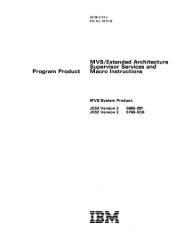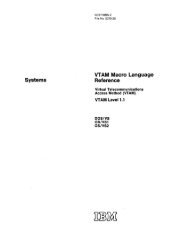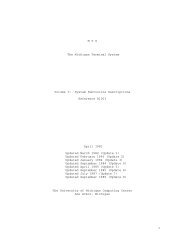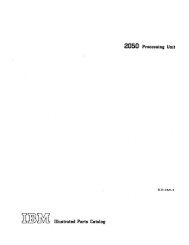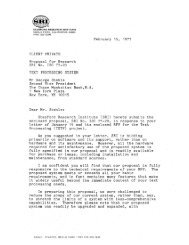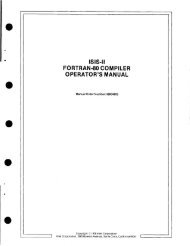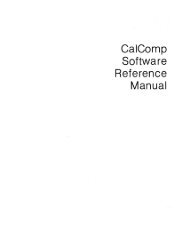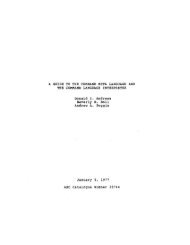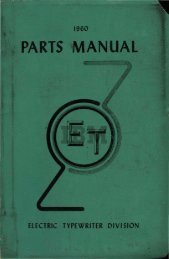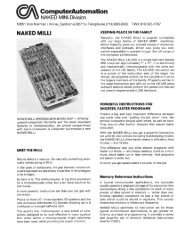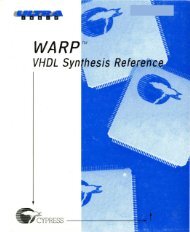- Page 1 and 2:
TOPS-20 PASCAL Language Manual AA-L
- Page 3 and 4:
CONTENTS PREFACE CHAPTER 1 INTRODUC
- Page 5 and 6:
7 • 1 . 1 7 . 1 . 2 7 • 1 . 3 7
- Page 7:
G-l G-2 G-3 G-4 Status of Stack Aft
- Page 10 and 11:
• Appendix A lists the various me
- Page 13 and 14:
CHAPTER I INTRODUCTION PASCAL-20 is
- Page 15 and 16:
PROGRAM Calculator (INPUT, OUTPUT);
- Page 17 and 18:
INTRODUCTION 1.1.6 Compilation Unit
- Page 19 and 20:
INTRODUCTION 1.2.3 Identifiers PASC
- Page 21 and 22:
INTRODUCTION The semicolon and the
- Page 23 and 24:
INTRODUCTION In the following examp
- Page 25 and 26:
CHAPTER 2 PASCAL DATA TYPES This ch
- Page 27 and 28:
PASCAL DATA TYPES In addition to de
- Page 29 and 30:
PASCAL DATA TYPES You can use strin
- Page 31 and 32:
PASCAL DATA TYPES The base type can
- Page 33 and 34:
PASCAL DATA TYPES is BOOLEAN, then
- Page 35 and 36:
PASCAL DATA TYPES In the three-dime
- Page 37 and 38:
PASCAL DATA TYPES To assign values
- Page 39 and 40:
PASCAL DATA TYPES 2.3.1.5 Array Exa
- Page 41 and 42:
PASCAL DATA TYPES The fields in thi
- Page 43 and 44:
PASCAL DATA TYPES 2.3.2.2 Assigning
- Page 45 and 46:
PASCAL DATA TYPES For example, assu
- Page 47 and 48:
PASCAL DATA TYPES Sets are compatib
- Page 49 and 50:
PASCAL DATA TYPES Example 3 F I 1..
- Page 51 and 52:
PASCAL DATA TYPES Pointer type defi
- Page 53:
PASCAL DATA TYPES Example 2 VAR Cit
- Page 56 and 57:
EXPRESSIONS Table 3-1: Arithmetic O
- Page 58 and 59:
EXPRESSIONS TabJe 1-2: Result Types
- Page 60 and 61:
EXPRESSIONS The set operators (+, *
- Page 62 and 63:
EXPRESSIONS PROGRAM Level_.O (IN PU
- Page 65 and 66:
CHAPTEH 4 PROGRAM HEADING AND DECLA
- Page 67 and 68:
PROGRAM HEADING AND DECLARATION SEC
- Page 69 and 70:
PROGRAM HEADING AND DECLARATION SEC
- Page 71:
PROGRAM HEADING AND DECLARATION SEC
- Page 74 and 75:
PASCAL STATEMENTS Simple and compou
- Page 76 and 77:
PASCAL STATEMENTS Example q Ase~5 :
- Page 78 and 79:
PASCAL STATEMENTS The objects of th
- Page 80 and 81:
PASCAL STATEMENTS Example 1 CASE EN
- Page 82 and 83:
PASCAL STATE~ENTS Example 4 := 1 TO
- Page 84 and 85:
PASC~L STATEMENTS 5.5 THE WITH STAT
- Page 86 and 87:
PASCAL STATEMENTS Example FOR I :=
- Page 89 and 90:
CHAPTER ~ PROCEDURES AND FUNCTIONS
- Page 91 and 92: PROCEDURES AND FUNCTIONS Table ~-l:
- Page 93 and 94: PROCEDURES AND FUNCTIONS Table ~-1:
- Page 95 and 96: PROCEDURES AND FUNCTIONS This progr
- Page 97 and 98: PROCEDURES AND FUNCTIONS You can al
- Page 99 and 100: PROCEDURES AND FUNCTIONS This progr
- Page 101 and 102: PROCEDURES AND FUNCTIONS Boolean fu
- Page 103 and 104: PROCEDURES AND FUNCTIONS Table ~-2:
- Page 105 and 106: PROCEDURES AND FUNCTIONS Table h-3:
- Page 107 and 108: PROCEDURES AND FUNCTIONS Table ~-3:
- Page 109 and 110: PROCEDURES AND FUNCTIONS Data items
- Page 111 and 112: PROCEDURES AND FUNCTIONS The actual
- Page 113 and 114: PROCEDURES AND FUNCTIONS An optiona
- Page 115 and 116: PROCEDURES AND FUNCTIONS Example 1
- Page 117 and 118: PROCEDURES AND FUNCTIONS Fo rma t 1
- Page 119 and 120: PROCEDURES AND FUNCTIONS As a resul
- Page 121 and 122: PROCEDURES AND FUNCTIONS label sect
- Page 123 and 124: PROCEDURES AND FUNCTIONS The functi
- Page 125 and 126: PROCEDURES AND FUNrTIONS Example 1
- Page 127 and 128: CHAPTER 7 INPUT AND OUTPUT This cha
- Page 129 and 130: INPUT AND OUTPUT In executing this
- Page 131 and 132: INPUT AND OUTPUT where: file variab
- Page 133 and 134: INPUT AND OUTPUT When you reach the
- Page 135 and 136: INPUT AND OUTPUT To specify only th
- Page 137 and 138: INPUT AND OUTPUT 7.7.4 Record Type
- Page 139 and 140: INPUT AND OUTPUT This example cause
- Page 141: INPUT AND OUTPUT 7.9 THE PUT PROCED
- Page 145 and 146: INPUT AND OUTPUT This program fragm
- Page 147 and 148: INPUT AND OUTPUT You must call REWR
- Page 149 and 150: INPUT AND OUTPUT The following rule
- Page 151 and 152: INPUT AND OUTPUT This example write
- Page 153 and 154: INPUT l\ND OUTPUT Example 1 BEGIN W
- Page 155: INPUT AND OUTPUT The first referenc
- Page 158 and 159: USING PASCAL ON TOPS-20 8.2 FILE SP
- Page 160 and 161: USING PASCAL ON TOPS-20 After plann
- Page 162 and 163: USING P~SCAL ON TOPS-20 /TAKE The /
- Page 164 and 165: USING PASCAL ON TOPS-20 If you omit
- Page 166 and 167: USING PASCAL ON TOPS-20 The first c
- Page 168 and 169: • AVERAGE SCORE SOURCE LISTING o
- Page 170 and 171: USING PASCAL ON TOPS-20 The compile
- Page 172 and 173: USING PASCAL ON TOPS-20 8.4.6.3 Cro
- Page 174 and 175: USTNG PASCAL ON TOPS-20 Example 3 f
- Page 176 and 177: PASDDT: THE PASCAL-20 DEBUGGER 9.3
- Page 178 and 179: PASDDT: THE PASCAL-?O DEBUGGER cons
- Page 180 and 181: PASDDT: THE PASCAL-20 DEBUGGER As s
- Page 182 and 183: PASDDT: THE PASCAL-20 DEBUGGER Note
- Page 184 and 185: PASDDT: THE PASCAL-20 DEBUGGER Note
- Page 186 and 187: PASDDT: THE PAS~AL-20 DEBUGGER ]. T
- Page 188 and 189: PASDDT: THE PASCAL-20 DEBUGGER Note
- Page 190 and 191: P~SDDT: THE PASCAL-?O DEBUGGER To r
- Page 193 and 194:
._------------- Table A-I: Run-time
- Page 195 and 196:
PASCAL MESSAGES -------------------
- Page 197 and 198:
PASCAL MESSAGES ? PASOl7 "BEGIN" ex
- Page 199 and 200:
PASCAL MESSAGES ? PASIOS Sign not a
- Page 201 and 202:
PASCAL MESSAGES ? PAS130 Expression
- Page 203 and 204:
PASCAL MESSAGES ? PAS157 Case label
- Page 205 and 206:
PASCAL MESSAGES ? PAS184 External p
- Page 207 and 208:
PASCAL MESSAGES ? PAS?II Incorrect
- Page 209 and 210:
PASCAL MESSAGES ? PAS253 Too many a
- Page 211:
PASCAL MESSAGES % PAS457 Nonstandar
- Page 214 and 215:
ASCII CHARACTER SET Table 8-1: The
- Page 217 and 218:
APPENDIX C SYNTAX SUMMARY This appe
- Page 219 and 220:
SYNTAX Sm1MARY ::= I I I I
- Page 221 and 222:
SYNTAX Sur~MARY ::= := ::= I
- Page 223 and 224:
SYNTAX SU~1MARY ::= ft ::= ::=
- Page 225:
SYNTAX SUr-1MARY ""= ::= ,
- Page 228 and 229:
-------- ---- ---- ----------------
- Page 230 and 231:
ISO COMPLIANCE 4. A program paramet
- Page 232 and 233:
ISO CO~PLIANCE The DISPOSE procedur
- Page 234 and 235:
ISO COMPLIANCE In the UNPACK(z,i. ,
- Page 236 and 237:
ISO COMPLIANCE In a FOR statement,
- Page 239 and 240:
APPENDIX F DIFFERENCES BETWEEN PASC
- Page 241 and 242:
DIFFERENCES BETWEEN PASCAL-20 AND V
- Page 243 and 244:
APPENDIX G PROCEDURE AND FUNCTION C
- Page 245 and 246:
PROCEDURE AND FUNCTION CALLING SEQU
- Page 247 and 248:
PROCEDURE ~ND FUNCTION CALLING SEQU
- Page 249 and 250:
INDEX /ABORT switch, 8-7 ABS functi
- Page 251 and 252:
Function (Cont.) EOF, 1-7, 6-14 EOL
- Page 253:
INDEX (Co n t. ) Set operator, 1-8,
- Page 256:
- Do Not Tear - Fold Here and Tape



